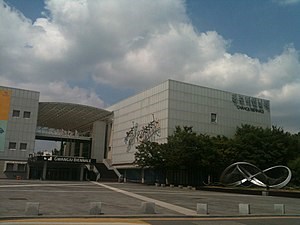
The Gwangju Biennale Foundation (President Park Yang-woo) and 15th Gwangju Biennale Artistic Director Nicolas Bourriaud are pleased to announce the title and theme of the 15th Gwangju Biennale, Pansori - a soundscape of the 21st century. The title pays tribute to pansori, a musical form which originated in south-west Korea in the 17th century to accompany shamanistic rituals. Its literal meaning being “the sound of the public place,” in other words, the voice of the common people.
The Biennale will be built as a narrative about the spaces we live in, the same way pansori singers practice storytelling with a lyrical or epic style, accompanied by a drumming for which different beats are connected to specific regions of Korea. Proposing a journey into contemporary space, the Biennale will gather artists whose works reflect our new spatial conditions and the upheavals of the Anthropocene. To draw this topology of our times, the exhibition will take an operatic shape, structured by musical metaphors. As both images and sounds are nothing but vibrations, Pansori - a soundscape of the 21st century presents itself as a visual symphony composed by international artists.
Climate change deeply transforms our relation to space, as did the recent pandemic. From the “social distances” and the measures of confinement to the extreme meteorological phenomena that provoke floods, desertification, and the rise of the oceans, our sense of space has dramatically changed in the last years.
Some scientific projections show that in the decades to come, only a small part of the planet will still be liveable. Taking two extremes, the worldwide housing crisis echoes the current race for a settlement on planet Mars. In parallel, hundreds of animal species come close to extinction because of the shrinking of their traditional ecosystems due to deforestation and human occupation. The Anthropocene raises one major question addressed to both collectivities and individuals: how to organize space between humans, animals, and organic life as a whole?
To address this question the exhibition weaves a narrative that links spatial concerns with emancipation struggles—from feminism and decolonization to LGBT+ rights. The Biennale explores our future homes, landscapes, territories, and cities in search of an organizational model for space which would allow a sustainable human settlement and preserve ecosystems.
Pansori - a soundscape of the 21st century draws a topology of the Anthropocene, where the spatial figures of climate change will be addressed through three sections, each corresponding to a sonic phenomenon. Visitors will follow a simple narrative—from the human density of urban space to the non-human worlds, either microscopic or cosmic. From a saturated planet to the search for the “big outdoors.”
The "Larsen effect,” also known as audio feedback, occurs when two sound emitters or receivers are too close one to another: it is produced by crowding, by lack of space. The first section will show a planet which has become an echo chamber, where everything is contiguous, contagious, or immediate. In a world saturated with human activities, both interhuman and interspecies relations become more intense.
According to the anthropologist Eduardo Viveiros de Castro, industrialized countries seem to live in a world where other living creatures are only part of the environment—like an opera whose musicians would have been muted, leaving the singer alone. Artists will renew the second section with the polyphony of the world by focusing on complexity and acknowledging that we live in a multi-focused and multi-layered universe.
The primordial sound is the sound of the origins, the Chinese Qi, the Buddhist Om, the first noise of the Big Bang. In the third section, artists will explore the non-human world, the “two immensities” that are in front of us: the cosmos and the molecular world. In a way, artists look for distance in a world of high-speed transport and immediate communication by observing the vastness of the cosmos and the minuscules of the molecular world.
Image : Gwangju Biennale Exhibition Centre

ArtDependence Magazine is an international magazine covering all spheres of contemporary art, as well as modern and classical art.
ArtDependence features the latest art news, highlighting interviews with today’s most influential artists, galleries, curators, collectors, fair directors and individuals at the axis of the arts.
The magazine also covers series of articles and reviews on critical art events, new publications and other foremost happenings in the art world.
If you would like to submit events or editorial content to ArtDependence Magazine, please feel free to reach the magazine via the contact page.